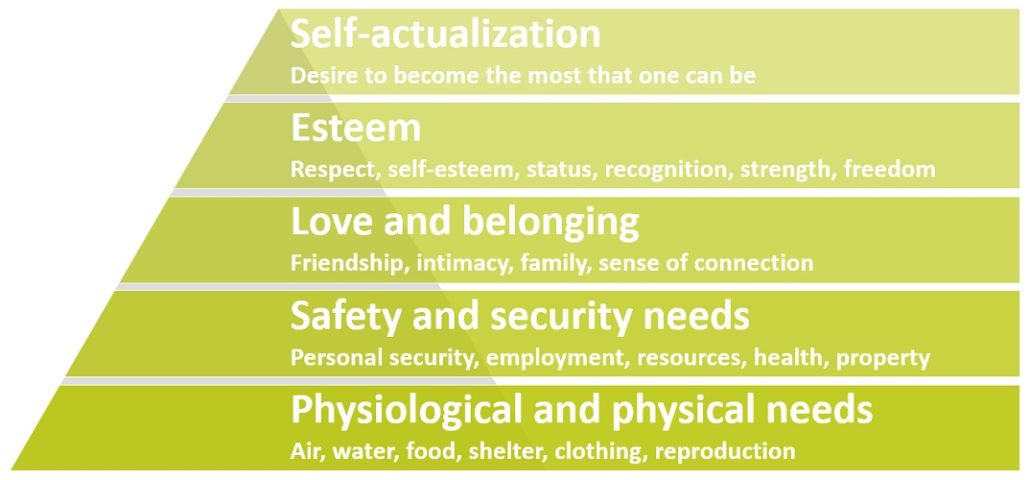
A need is something we must have, should have or want very much. However, needs are different to wants because if you do not fulfill a need, you will have a negative outcome that stops you enjoying a healthy life.
In 1943 Abraham Maslow published his paper ‘A Theory of Human Motivation’ and it sets out a hierarchy of needs that details the things we all need to feel fulfilled in life:

For example: The base level in the hierarchy above covers the Physiological & Physical needs like shelter, food and water. If an individual does not feel they have achieved some or many of these basic life requirements, it can be the cause of negative outcomes like stress. We know it would cause stress if we were unable to eat or were homeless, so thankfully most of us have these basic needs covered.
The next level in the hierarchy looks at Safety and Security, and this is the area where most of the stress in the modern world sits. Having long term security in life or control over our future can reduce stress levels, however the fear of losing something like a job or our home can be the cause of significant amounts of stress.
The higher levels then focus on Love and Belonging, then Esteem and finally Self-Actualization. As the father of the humanist approach, Maslow felt the higher categories only emerge when people feel they have truly satisfied the base levels.
Tip: If your client is feeling stressed, it can be helpful to work through each layer of Maslow’s hierarchy of needs in your coaching sessions, to check if their basic needs are being met.
It is possible to fully satisfy our needs, but for that to happen, we must first identify them precisely. The approach we suggest taking is to focus on helping your clients identify and understand their needs, then use positive energy sources as motivation.
But we know it can be difficult for them to try and satisfy needs on their own or in secret. So we also recommend encouraging your clients to have an open and honest conversation with trusted family members or close friends. That way, they can get additional help or support to identify or validate their needs and find ways to meet them.
However, some clients will find this really difficult and may even feel embarrassed, or ashamed when asked to identify and discuss their needs. They may feel their needs are a mirror of who they truly are as a human being, but needs are not always personal. Current theory suggests that a need is simply a piece of our development that was not well treated during childhood. This is not normally a deliberate act by the parents or guardian, as they may not have identified this as a need, or recognized how important it was for us and our development.
Coaching needs and finding ways to nourish them properly will help your clients avoid stress. But it does take time to fully understand how needs can be satisfied forever. Especially if your client organizes their life to satisfy the same need again and again. This will divert energy away from where they need it most.
So, the key to understanding our needs is to help clients master a way to identify and then satisfy needs. Then it just happens automatically in the shadows, while they live their lives.
To support your coaching sessions, we have published a range of ebooks, kits and games:
Coaching Needs: This 12 page ebook provides you with an essential toolkit for coaching needs. The simple guide helps identify needs and develop action plans to help satisfy them.
Coaching Beliefs: This 19 page e-book can be used when coaching others or for your own personal development. It has three main sections and gives a clear introduction to beliefs. Then provides a simple step by step process to identify or review personal beliefs. The final section helps you focus on negative beliefs to show you how to change life scripts that could hold you or your clients back.
Content is constantly being added to the site, so please check our on-line shop. Or read some of the other blog posts written by our team of international coaches.
Image: Thanks to Andrea for sharing their work on Pexels.
Please note – Our blog content can only be shared if you include a reference and link to the original source: (cc) MyCoachingToolkit.com – 2023